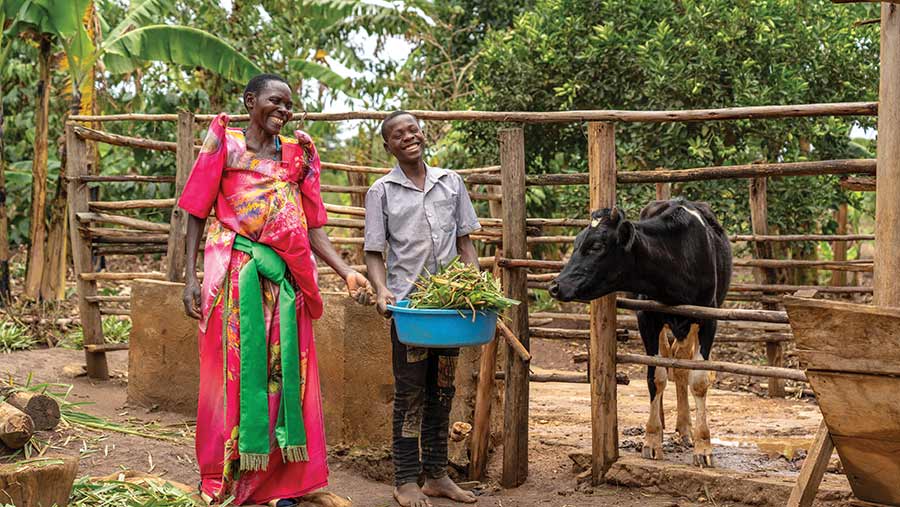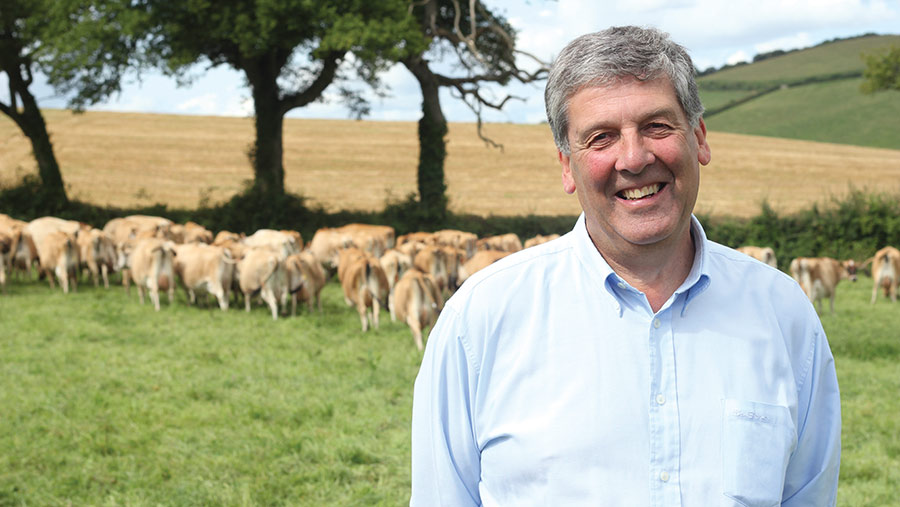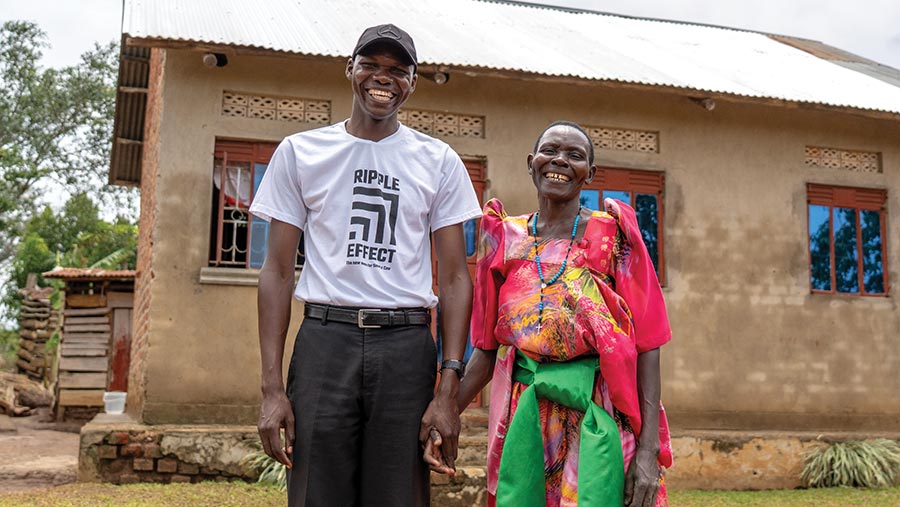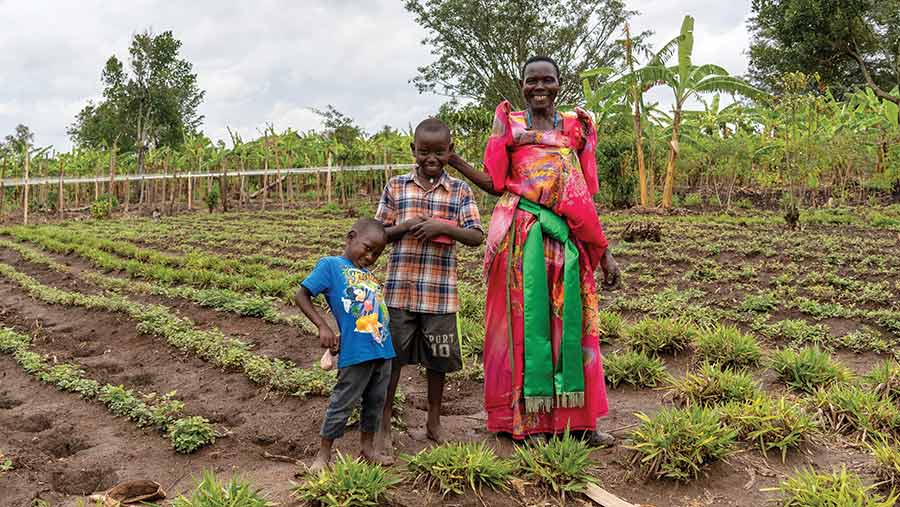How Devon farmer’s send-a-cow-to-Africa charity has changed lives
 © Antony Kahaya
© Antony Kahaya A Devon farmer’s idea to send cows to Uganda has grown into an organisation offering training in sustainable farming and business skills across rural east Africa.
When dairy farmer David Bragg first had the idea to send a cow to Uganda, little did he know it would grow into an organisation working with nearly 1.38 million people across rural Africa.
Last year, Send a Cow changed its name to Ripple Effect to reflect the range – and impact – of the work it does with farming families in Burundi, Ethiopia, Kenya, Rwanda, Uganda and Zambia.
See also: How to store, analyse and spread organic manure for best value

David Bragg © Ripple Effect
“We started with what some might consider a somewhat naïve process of providing milk for families for nutrition,” says David, who is now retired and rents his farm in Lapford, Devon, to his daughter and son-in-law.
“But we discovered we were providing animals that gave manure that contributed to compost making that contributed to soil health and fertility, so families with animals benefited significantly.
“If someone was given an animal, they would breed a female replacement and pass it on. But people were also very willing to transfer their knowledge between each other.
“There was a real sense of the ripple effect happening long before it became known as Ripple Effect.”
An agroecological approach was developed, with the aim of building people’s capacity to manage their own resources better.
The cow remained very much part of it, says David, but increasingly other animals, such as goats and rabbits, were also used as part of an overall goal to improve productivity.
Family roles
Tackling social issues is also key to successful outcomes when working with a community. Families are encouraged to identify which members are doing which household tasks and who could be making a better contribution.
“We increasingly find that women are empowered to become more involved in decision making and income generation, and men are very willing for that to happen and contribute to things they wouldn’t have [previously], like fetching water and looking after the children while the women are in training,” says David.
Robert Tamuzade, an enterprise development officer for Ripple Effect, worked on a project in Kyotera, a flat area of poor soils in the Central Region of Uganda, from 2016 until this year.
The project involved 400 households headed by a widow, widower or child (the area was badly affected by HIV Aids).
Training
In the first year, training in home and personal hygiene, and relational and group leadership skills, was given, and psychosocial support offered. In year two, 54 households expressed an interest in having a cow.
They were trained in pasture and animal management and in-calf cows were sourced.
By the end of that year, 74 in-calf cows had been distributed to trainee farmers. “Many farmers wanted cows, but they had to have enough land to grow food for the family as well as pasture for livestock,” says Robert.
Malnourishment among children, and even adults, was such that consumption of animal products by the community was the priority, to improve health.
Group members without cows could buy milk at low cost from those that did. And for those in extreme need, families with cows shared milk free of charge.
As well as livestock, families were given seeds to grow crops. With training in business skills, they started growing crops for sale, selling and marketing together in groups to earn more money.
They were also trained in how to save their income as a group, accumulating profits that could then be used to buy land in preparation to receive a “pass-on” gift.
Power of the cow
By the end of the project, there were 131 cows in the community.
“A dairy cow for an African farmer is a very powerful tool because it provides plenty of milk for the family, and crop yields are increased because manure is collected and composted to feed the crops.
“It also brings respect, and there is money to spend on healthcare and school fees,” says Robert.
“Previously, so many children were not going to school because families couldn’t afford it. At the end of the project, children had graduated from school because of the power of the cow.”
A livestock committee, elected by the farmers, was set up to ensure their animals continue to be managed well.
And a young farmer was trained to offer veterinary services such as artificial insemination and routine treatment, to monitor the cows’ performance and offer advice, paid for by the farmers.
Case study: Lucy Nalule

Ripple Effect’s Robert Tamuzade with Lucy Nulale © Ripple Effect
Lucy Nalule relies on the land surrounding her home to grow food and gain any income.
Widowed, and with four children to care for, she was finding it increasingly hard to grow enough food as the weather became more unpredictable and the soil less productive.
This led to her children suffering from regular bouts of disease.
“Before Ripple Effect came to us, we would frequently fall sick,” she says. “Our main food was matooke [plantain bananas] and that would grow weak, and we only had dirty water.”
Working with Robert Tamuzade, Lucy has learned how to grow a variety of fruits and vegetables in her kitchen garden.
The family was also given a cow, whose manure, combined with training in crop rotation, bedding and water storage, has rejuvenated the soil.
As a result, the household’s nutrition and income have greatly improved, and Lucy can now afford to pay for her children’s school fees and books.
“One of my highlights of working with Ripple Effect is the wide recognition we received. I used to lack confidence and people would not come to my home. But we have become known far and wide,” she says.
Lucy has created her own ripple effect of positive change by sharing what she has, and what she knows, with her neighbours.
After she received her cow, it gave birth to a female calf, which she passed on to her neighbour Gerald, ensuring he could also access the milk and manure that have made such a difference in her life.
Growing forage crops using the push-pull method

© Ripple Effect
Instead of sending animals out to graze whatever they can find by day and bringing them back at night without any further feed, Ripple Effect has trained farmers to grow productive forage crops using the push-pull technique.
This method has been developed in partnership with the International Centre of Insect Physiology and Ecology and supported by Rothamsted Research.
It involves planting maize in a 40sq m block, bordered by a 2m-wide strip of napier or bracharia grass, with leguminous desmodium planted between the maize rows.
The desmodium controls Striga, a parasitic weed that attaches itself to maize roots and sucks out nutrients, by causing suicide germination, while the grass on the border acts as an attractant trap plant for pests such as stemborers.
By growing three forage crops together, the maize is protected, while also benefiting from nitrogen-fixing by the desmodium.
Napier grass and desmodium also provide high-quality forage, and because they are perennial plants, they conserve soil moisture and improve soil health.
Find out more about Ripple Effect
For more on Ripple Effect or to make a donation, go to the Ripple Effect website.
